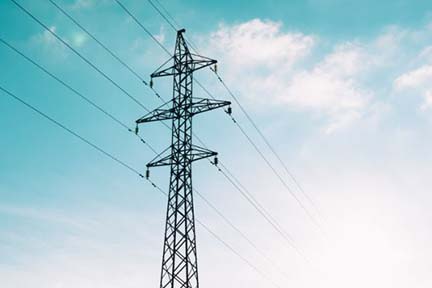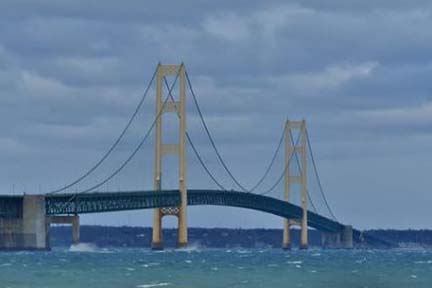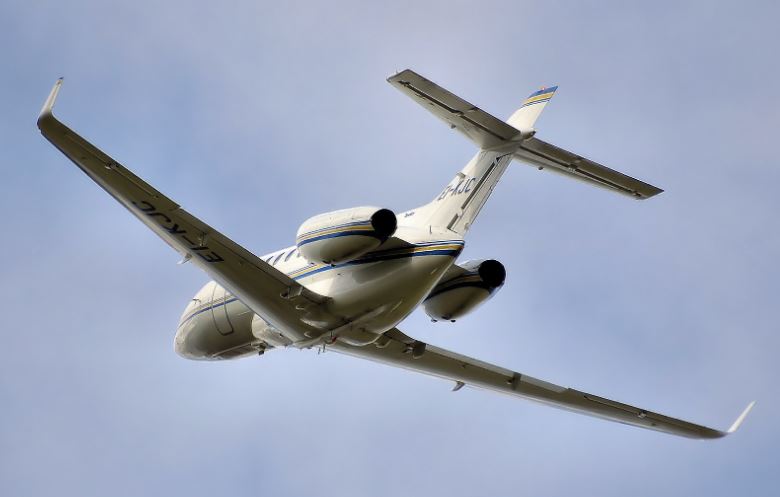
AG Seeks to Reduce DTE Electric’s 10% Rate Hike to Less than 3%
|
|
|
|

|
|
|
|

|
|
|
|


New St. Ignace Mackinac Bridge Walk starting location announced for 2024 ST. IGNACE, Mich. – For the safety and convenience of participants who start from the St. Ignace side for the 2024 Mackinac Bridge Walk, the walk will begin from Bridge View Park on the west side of I-75 rather than at the Mackinac Bridge Authority (MBA) administration building. As most participants who start in St. Ignace already park at Bridge View Park, starting the walk from that side reduces the number of people crossing the interstate before the event begins. Participants who park on the east side of I-75 will now be guided across the road before and after walking the bridge. “Far more parking is available in Bridge View Park and there is also more room for gathering before the start of the event,” said MBA Bridge Director Kim Nowack. “Starting the walk from that side of I-75 will be more convenient and safer for most participants.” Based on the success of the recent events, the MBA will again start the 2024 Bridge Walk from both St. Ignace and Mackinaw City, which eliminates the need for busing and offers additional options for participants. A video, posted on the MBA website at www.MackinacBridge.org/Walk, explains the bridge walk schedule and the choices people have whether they start from the north or south end of the bridge. Walkers essentially have three main options, outlined in the video:
As for the last several years, because walkers can start from either end of the bridge when they arrive, there will be no buses transporting participants across the bridge. Participants must plan accordingly to ensure they end their walk on the same side of the bridge as their transportation. The MBA does not provide any shuttle service after the walk and cannot guarantee outside shuttle services will be offered. The bridge will again be closed to public traffic during the 2024 walk, from 6:30 a.m. to noon on Labor Day, Sept. 2, based on recommendations from the Michigan State Police and U.S. Department of Homeland Security. Emergency vehicles will still be permitted to cross the bridge, but no public vehicles until the walk concludes and participants are off the bridge. The bridge walk has been an annual event since 1958, with the exception of 2020. The 2024 walk will be the 66th event. Between 20,000 and 35,000 people have participated in recent years; 35,000 participated in the 2023 event. |

|
|
|
|


FOR IMMEDIATE RELEASE July 29, 2024 Contact: [email protected]
Lt. Governor Gilchrist Announces Grants Under Federal Partnership to make Michigan’s National Parks More Accessible National Park Mobility Challenge grants will enhance access and visitor experience
LANSING, Mich.— Today, Lieutenant Governor Garlin Gilchrist II joined the National Park Service (NPS) to announce the first round of grant funding under the National Park Service Mobility Challenge Program, a partnership with the Biden-Harris Administration. The funding will support three innovative projects to improve access, visitor experience, and environmental conservation in Michigan’s state and national parks.
“Every Michigander should be able to enjoy the incredible natural resources we are blessed to steward,” said Lieutenant Governor Garlin Gilchrist II. “These grants represent a key milestone in our efforts alongside the National Park Service to pioneer future mobility in our state and national parks. We will keep working hard to build on our historic investments in Michigan parks, improve our park experiences, grow our economy, and preserve our natural landscapes for decades to come.”
Grant recipients are as follows:
National Park Service Mobility Challenge The National Park Service Mobility Challenge is a challenge issued to the global mobility industry to identify and deploy advanced mobility and electrification technologies in and around Michigan’s state and national parks, improving safety, sustainability, and equitable access through new mobility technology.
This challenge builds on a pre-existing partnership between NPS and Michigan to improve access at National Parks using mobility technologies. Governor Whitmer first announced the partnership in 2022 between the National Park Service and multiple departments within the state of Michigan including the Michigan Outdoor Recreation Industry Office, the Department of Transportation (MDOT), the Department of Labor and Economic Development (LEO), and the Office of Future Mobility and Electrification (OFME) with the goal of implementing safe, innovative technology to increase accessibility and equity in parks.
The NPMMC directly supports the goals and initiatives outlined in the MI Healthy Climate Plan, which aims to reduce greenhouse gas emissions and transition the State toward economy-wide carbon neutrality. The challenge also ladders back to broader sustainability goals outlined in the Michigan Office of Future Mobility and Electrification’s MI Future Mobility Plan, which entails providing safer, greener, and more accessible transportation infrastructure for Michiganders.
“The National Park Service is looking forward to the exciting innovations the Michigan Mobility Challenge will bring to the transportation needs of our visitors and gateway communities.,” said Bert Frost, National Park Service Midwest Regional Director.
“At ADASTEC, we are honored to collaborate with the National Park Service, the U.S. DOT Volpe Center, Michigan Department of Transportation, and the Michigan Economic Development Corporation—Office of Future Mobility and Electrification to bring our advanced automated bus technology to Sleeping Bear Dunes National Lakeshore,” said Cemre Kavvasoğlu, Product Management Director, ADASTEC North America. “This project underscores our commitment to sustainability, accessibility, and innovation in public transportation. By working alongside Vicinity Motor Corp and ARIBO, leveraging our extensive deployment experience, we aim to enhance the visitor experience while preserving the natural beauty of the national parks.”
“Our mission at ADASTEC is to solve modern city mobility problems with automated public transportation,” said Dr. Ali Peker, Chief Executive Officer of ADASTEC. “This project highlights our focus on providing clean, 24/7 available, accessible, sustainable transportation for all. Together with our partners, we are bringing the first low-floor, automated bus that meets FMVSS and ADA requirements to the market. This collaboration demonstrates our commitment to advancing mobility in a way that benefits both the environment and the community.”
“I am incredibly excited about the progress we have made in advancing sustainable mobility within our national parks,” said Justine Johnson, Chief Mobility Officer for the State of Michigan. “These new initiatives not only reflect Michigan’s innovative capabilities but also significantly contribute to our broader mobility ecosystem, propelling us toward a more interconnected and sustainable future.”
About Michigan Economic Development Corporation (MEDC) The Michigan Economic Development Corporation is the state’s marketing arm and lead advocate for business development, job awareness and community development with the focus on growing Michigan’s economy. For more information on the MEDC and our initiatives, visit www.MichiganBusiness.org
About the National Park Service Emerging Mobility Initiative Since 2018, the U.S. DOT Volpe Center has worked with the National Park Service (NPS) to develop a strategy to help national parks adapt to and proactively address emerging mobility trends, including electric vehicles and charging, micromobility, traveler information technologies, ridehailing, and automated driving systems.
The U.S. DOT Volpe Center is supporting NPS in exploring emerging mobility projects with dozens of parks across the country. The U.S. DOT Volpe Center provides NPS with extensive technical assistance at all stages of the projects, including assessment, planning, deployment, and evaluation. Findings from these demonstration projects will support future efforts related to the safe integration of these new technologies. Emerging mobility project opportunities include:
###
|
|||||
|
ReplyForward
|